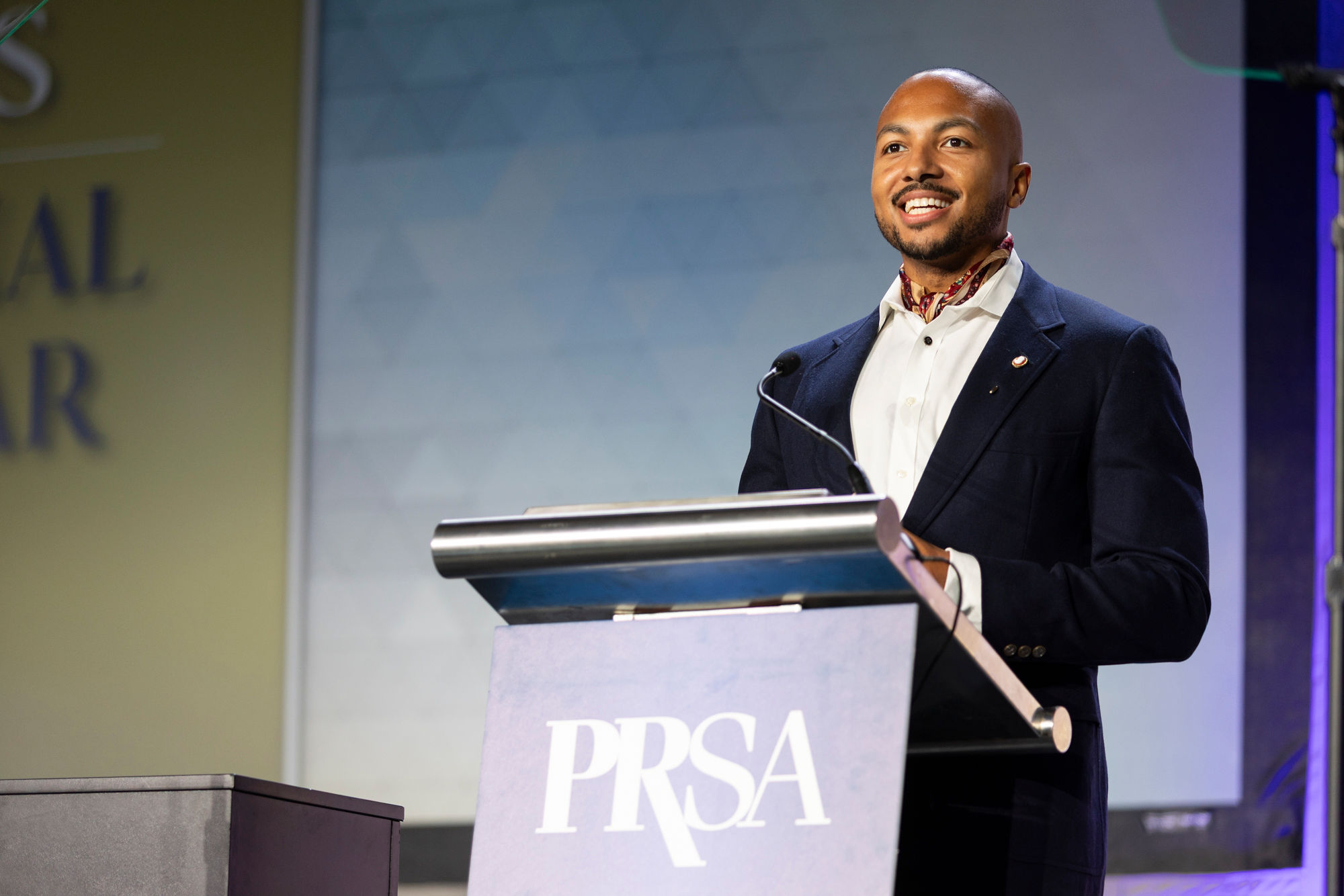PRSA's PR Pro of the Year: Dominic K. Hawkins II on Advocacy and Impact
By John Elsasser
November-December 2025
As vice president of communications at the NAACP, Dominic K. Hawkins II leads the organization’s integrated marketing and communications strategy to advance civil rights and social justice. Named PRSA’s 2025 PR Professional of the Year, Hawkins has built a career at the intersection of advocacy and impact, guiding narratives that uplift communities and drive progress.
With previous leadership roles spanning tech, public health, financial services and social justice — including work at TIAA, Deloitte and SKDK — Hawkins is recognized for his strategic insight, mentorship of emerging communicators and commitment to equity. In this conversation with Strategies & Tactics, he reflects on leadership, the power of storytelling, and where he sees opportunity and optimism ahead.
What does a typical day look like for you leading communications at the NAACP?
Working in issues advocacy, no day is the same. On some days, my team and I are responding to the news of the day. On others, I’ll have back-to-back meetings with colleagues and external partners on how we can uplift the Association’s work across advocacy, legal, policy, field engagement and more.
On other days, I have a little more breathing room to think strategically and creatively. No matter what, I leave room to check in with my team to see where they may need support and how I can lean in.
Do you have a morning routine to prepare you for the workday?
My day starts between 5:30 and 6 a.m. with mindfulness, gratitude and prayer. I’m a big believer in daily pages — writing three pages of conscious thought.
Before I can do anything, I need to center myself and get mentally prepared for whatever the day has in store. Then, I usually go to the gym or take a hot yoga class. From there, I think about what one to three things I need to accomplish that day and review morning clips and newsletters.
In your role, how do you balance the urgency of social justice communications with the need for strategic, long-term messaging?
We can’t be everything to everybody all at once. We’ve got to be strategic and deliberate with what news-of-the-day we respond to, and what that looks like. In social justice communications, you’ve got to expect the unexpected, but I balance that by having a clear understanding of what I need to accomplish that day.
If I can get just one thing done off my list that I need to do to propel our long-term communications, then I’m happy. If our POV on breaking news goes wide, I’m happy too. But part of my job is to ensure that we’re driving the narrative that the NAACP is at the forefront of the social justice movement, and that doesn’t happen through soundbites. That narrative is told through consistent stories of NAACP’s advocacy work, and it’s my job to tell that story.
Given the headwinds that DEI initiatives have faced in 2025, where do you see new opportunities for meaningful, lasting impact?
Attacks on DEI are a distraction — albeit an enticing one. At NAACP, we recognize that building economic power in our communities is how we’re going to drive lasting impact in this moment.
For example, our Black Consumer Index — a tactical spending guide — provides our audience with a list of companies that support diverse communities and those that don’t, so consumers can choose where to spend their hard-earned dollars accordingly. We’ve also launched NAACP Capital, a $200 million venture capital fund that invests in startups and funds that leverage technology to solve the biggest challenges facing Black communities.
You joined the NAACP in July 2024. What progress or bright spots have you seen through your work that give you optimism for the road ahead?
I’m particularly optimistic about how Americans have banded together to hold elected officials accountable. They’re paying more attention to civics, how voting up and down ballots matter, and how that affects their day-to-day life.
[As of this interview], we’re in a government shutdown over a fight over whether or not to fund affordable health care. No matter what your politics are or who you voted for, millions of Americans are about to see their health insurance costs skyrocket, showing that elections — whether local, state or national — have consequences.
As more people realize their own civic power, I’m optimistic that more people will choose to exercise it.
What leadership lessons have you carried from your work in corporate and agency roles into the nonprofit advocacy space?
The biggest leadership lesson I’ve learned is to be a servant leader. Leadership should be about a willingness to serve an organization, a client or your team — not have them serve you. It’s about giving all you have to advance a mission.
Being a leader is about empowering others to be their best selves. I try to make sure I’m pouring into my team as much as possible, so they can pour into their work.
What advice do you give students and new pros about working at the intersection of PR and social impact?
Remember to take care of yourself. PR is already demanding, but when combined with social justice, this work can be emotionally draining, and we have to develop emotional resilience.
But we’re not robots. We have our own thoughts and feelings. I remember when we ran a petition to pardon a man on death row for a crime he didn’t commit. Tragically, he was executed by the state. My team was devastated.
At the same time, we know there is so much happening in our world, we have to be able to take care of ourselves, so we can continue our fight to drive change across the nation. We have to give ourselves time to rest and recharge; otherwise, we can burn out, lose focus or sacrifice our own health.
What keeps you motivated and hopeful about the power of communications to drive change?
I mentioned the emotional demands of advocacy communications, but this work is also extremely rewarding. When you see how a story you worked on benefited a community or how a social media post went viral, bringing attention to an important issue, it’s those moments that remind us why we need to keep moving forward. It’s proof of the power of storytelling to shape hearts and minds and promote progress for all Americans. ϖ
At ICON 2025, we asked Hawkins a “why” that he's asking himself right now as he looks ahead to the future of the profession:



